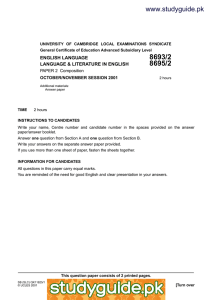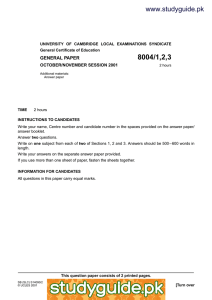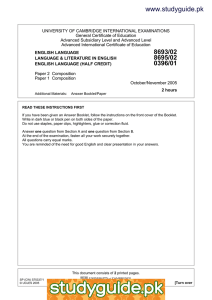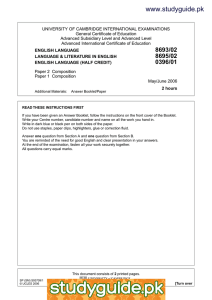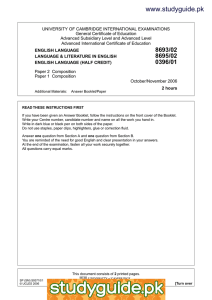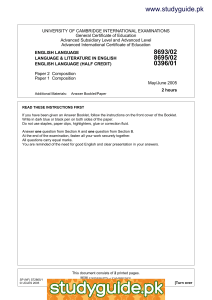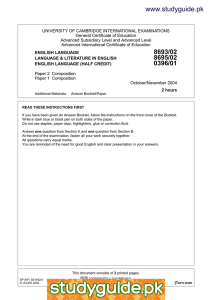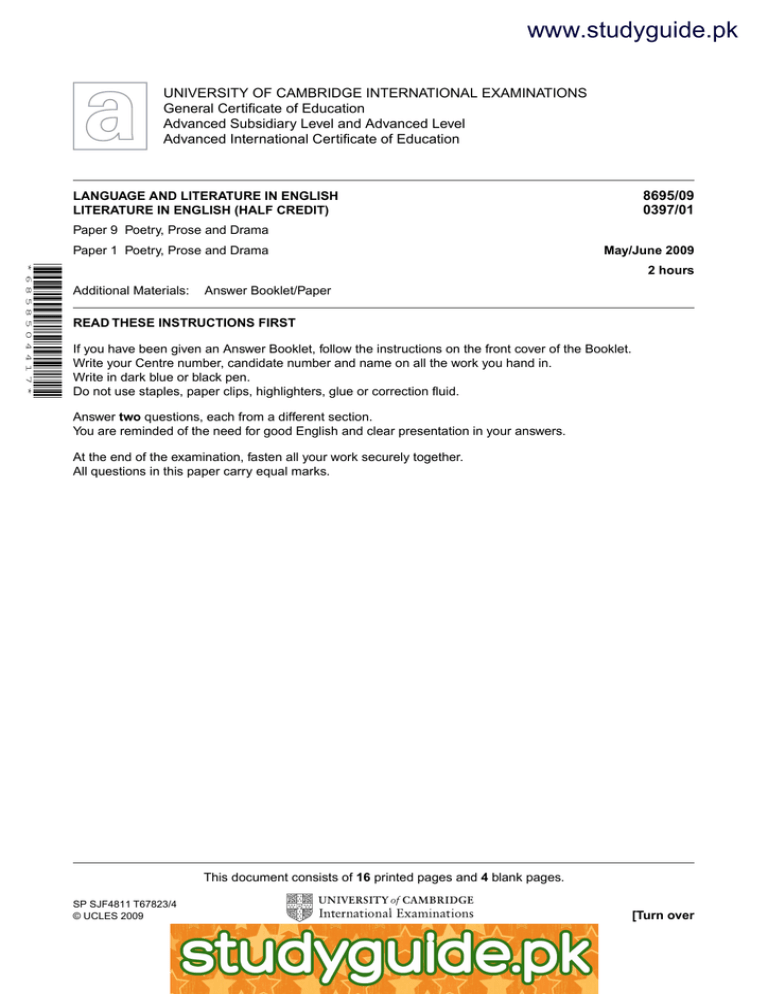
www.studyguide.pk
UNIVERSITY OF CAMBRIDGE INTERNATIONAL EXAMINATIONS
General Certificate of Education
Advanced Subsidiary Level and Advanced Level
Advanced International Certificate of Education
8695/09
0397/01
LANGUAGE AND LITERATURE IN ENGLISH
LITERATURE IN ENGLISH (HALF CREDIT)
Paper 9 Poetry, Prose and Drama
Paper 1 Poetry, Prose and Drama
May/June 2009
*6858504417*
2 hours
Additional Materials:
Answer Booklet/Paper
READ THESE INSTRUCTIONS FIRST
If you have been given an Answer Booklet, follow the instructions on the front cover of the Booklet.
Write your Centre number, candidate number and name on all the work you hand in.
Write in dark blue or black pen.
Do not use staples, paper clips, highlighters, glue or correction fluid.
Answer two questions, each from a different section.
You are reminded of the need for good English and clear presentation in your answers.
At the end of the examination, fasten all your work securely together.
All questions in this paper carry equal marks.
This document consists of 16 printed pages and 4 blank pages.
SP SJF4811 T67823/4
© UCLES 2009
[Turn over
www.xtremepapers.net
www.studyguide.pk
2
Section A: Poetry
SUJATA BHATT: Point No Point
1
Either
(a) ‘The other night
I dreamt English
Was my middle name.’
Referring to two or three poems you have studied, discuss ways in which Bhatt’s
poetry explores different cultural influences.
Or
(b) Comment closely on the following poem, discussing ways in which it presents the
vibrancy of life in India.
The Doors Are Always Open
Everywhere you turn there are goats,
some black and lumpy.
Others, with oily mushroom-soft hair,
sticky yellow in Muslim sand
shaded by the mosque.
Next door
there’s a kerosene smeared kitchen.
We share a window
with the woman who lives with goats.
Now she unwraps some cheese
now she beats and kneads
a little boy
and screams
‘Idiot! Don’t you tease that pregnant goat again!’
I look away: outside
the rooster runs away
from his dangling sliced head
while the pregnant goat lies with mourning hens.
Her bleating consolations
make the children spill
cheesy milk and run outside.
Wet soccer ball bubbles roll out
from a hole beneath the lifted tail.
The goat licks her kids free,
pushing, pushing
until they all wobble about.
We’ve counted five.
Hopping up and down, we push each other
until we see
the goat pushing her kids
to stand up, until
mothers call us back
to thick milk.
© UCLES 2009
8695/09/M/J/09
www.xtremepapers.net
5
10
15
20
25
30
www.studyguide.pk
3
Songs of Ourselves
2
Either
(a) Discuss ways in which poets explore family relationships, referring to two or three
poems from your selection.
Or
(b) Comment closely on the language and form of the following poem, paying particular
attention to the ways in which Hopkins expresses his response to the natural world.
Pied Beauty
Glory be to God for dappled things –
For skies of couple-colour as a brinded cow;
For rose-moles all in stipple upon trout that swim;
Fresh-firecoal chestnut-falls; finches’ wings;
Landscape plotted and pieced – fold, fallow, and plough;
And all trades, their gear and tackle and trim.
All things counter, original, spare, strange;
Whatever is fickle, freckled (who knows how?)
With swift, slow; sweet, sour; adazzle, dim;
He fathers-forth whose beauty is past change:
Praise him.
5
10
Gerard Manley Hopkins
© UCLES 2009
8695/09/M/J/09
www.xtremepapers.net
[Turn over
www.studyguide.pk
4
WILLIAM WORDSWORTH: Selected Poems
3
Either
(a) ‘The Child is Father of the Man.’
Discuss ways in which Wordsworth explores the value of childhood experiences in
two of the poems you have studied.
Or
(b) Comment closely on the effects of the following poem, saying how far you find it
characteristic of Wordsworth’s poetry that you have studied.
London 1802
Milton! thou should’st be living at this hour:
England hath need of thee: she is a fen
Of stagnant waters: altar, sword and pen,
Fireside, the heroic wealth of hall and bower,
Have forfeited their ancient English dower
Of inward happiness. We are selfish men;
Oh! raise us up, return to us again;
And give us manners, virtue, freedom, power.
Thy soul was like a Star and dwelt apart:
Thou hadst a voice whose sound was like the sea;
Pure as the naked heavens, majestic, free,
So didst thou travel on life’s common way,
In chearful godliness; and yet thy heart
The lowliest duties on itself did lay.
© UCLES 2009
8695/09/M/J/09
www.xtremepapers.net
5
10
www.studyguide.pk
5
BLANK PAGE
Turn to page 6 for Question 4.
8695/09/M/J/09
www.xtremepapers.net
[Turn over
www.studyguide.pk
6
Section B: Prose
CHINUA ACHEBE: Anthills of the Savannah
4
Either
(a) Ikem suggests that imperialism and Africans themselves are equally to blame for
Kangan’s problems. To what extent do you find this view borne out in the novel?
Or
(b) Discuss the following passage in detail, commenting on the presentation of politics
and power.
The Attorney-General was perched on the edge of his chair, his left elbow
on the table, his neck craning forward to catch His Excellency’s words which he
had chosen to speak with unusual softness as if deliberately to put his hearer at
a disadvantage; or on full alert on pain of missing a life and death password. As
he watched his victim straining to catch the vital message he felt again that glow
of quiet jubilation that had become a frequent companion especially when as now
he was disposing with consummate ease of some of those troublesome people he
had thought so formidable in his apprentice days in power. It takes a lion to tame a
leopard, say our people. How right they are!
As he savoured this wonderful sense of achievement gained in so short a time
spreading over and soaking into the core of his thinking and his being like freshred tasty palm-oil melting and diffusing itself over piping hot roast yam he withdrew
his voice still further into his throat and, for good measure, threw his head back on
his huge, black, leather chair so that he seemed to address his words at the high,
indifferent ceiling rather than the solicitous listener across the table.
Suddenly suspicious like a quarry sniffing death in the air but uncertain in
what quarter it might lurk the Attorney-General decided to stall. For a whole minute
almost, he stood on one spot, making no move, offering no reply.
‘Well?’ His Excellency was stung into loudness by the other’s delay and silence.
He was also now sitting bolt upright. ‘Did you hear what I said or should I repeat?’
‘No need to repeat, Your Excellency. I heard you perfectly. You see, Your
Excellency, your humble servant is a lawyer. My profession enjoins me to trust only
hard evidence and to distrust personal feeling and mere suspicion.’
‘Attorney-General, I sent for you not to read me a lecture but to answer my
question. You may be the Attorney but don’t forget I am the General.’
The Attorney-General exploded into peals of laughter, uncontrollable and beerbellied. Through it he repeated again and again whenever he could: ‘That’s a good
one, Your Excellency, that’s a good one!’ His Excellency, no doubt pleased with the
dramatic result his wit had produced but not deigning to show it, merely fixed a pair
of immobile but somewhat indulgent eyes on his Attorney-General, patiently waiting
for his mirth to run its course. Finally it began to as he took the neatly-folded silk
handkerchief out of his breast-pocket and dabbed his eyes daintily like a fat clown.
‘You will now answer my question?’ said His Excellency in a slightly amused
tone.
‘I am sorry, Your Excellency. Don’t blame me; blame your Excellency’s inimitable
sense of humour … To speak the truth, Your Excellency, I have no evidence of
disloyalty on the part of my honourable colleague.’ He paused for effect. But nothing
showed on His Excellency’s face. ‘But lawyers are also human. I have a personal
feeling which may not stand up in court, I agree, but I hold it very strongly and if
Chris were here I would say it to his face. I don’t think Chris is one hundred per cent
behind you.’
‘Why do you think you have that feeling?’
‘Why do I have it? Well let’s put it this way. I have watched my colleague in
question closely in the last year or so and my impression is that he does not show
© UCLES 2009
8695/09/M/J/09
www.xtremepapers.net
5
10
15
20
25
30
35
40
www.studyguide.pk
7
any joy, any enthusiasm in matters concerning this government in general and Your
Excellency in particular. I was saying precisely that to him only a few minutes ago.
Why do you go about with this tight face all the time, I said. Cheer up my friend. But
he can’t cheer up. Why? The reason is not far to seek. Two of you were after all
class-mates at Lord Lugard College. He looks back to those days and sees you as
the boy next door. He cannot understand how this same boy with whom he played
all the boyish pranks, how he can today become this nation’s Man of Destiny. You
know, Your Excellency it was the same trouble Jesus had to face with his people.
Those who knew him and knew his background were saying: “Is it not the same
fellow who was born in a goat shed because his father had no money to pay for a
chalet?” …’
45
50
55
Chapter 2
© UCLES 2009
8695/09/M/J/09
www.xtremepapers.net
[Turn over
www.studyguide.pk
8
CHARLOTTE BRONTË: Jane Eyre
5
Either
(a) ‘It was my time to assume ascendancy. My powers were in play and in force.’
Discuss ways in which Brontë shows Jane gaining control of her own destiny in the
novel.
Or
(b) Comment closely on the following passage, paying particular attention to the
characterisation of Mr Brocklehurst and his ideals.
‘Madam, allow me an instant. You are aware that my plan in bringing up these
girls is, not to accustom them to habits of luxury and indulgence, but to render
them hardy, patient, self-denying. Should any little accidental disappointment of
the appetite occur, such as the spoiling of a meal, the under or the over-dressing
of a dish, the incident ought not to be neutralized by replacing with something
more delicate the comfort lost, thus pampering the body and obviating the aim of
this institution; it ought to be improved to the spiritual edification of the pupils, by
encouraging them to evince fortitude under the temporary privation. A brief address
on those occasions would not be mistimed, wherein a judicious instructor would
take the opportunity of referring to the sufferings of the primitive Christians; to the
torments of martyrs; to the exhortations of Our Blessed Lord Himself, calling upon
His disciples to take up their cross and follow Him; to His warnings that man shall
not live by bread alone, but by every word that proceedeth out of the mouth of God;
to His divine consolations, “If ye suffer hunger or thirst for My sake, happy are ye.”
Oh, madam, when you put bread and cheese, instead of burnt porridge, into these
children’s mouths, you may indeed feed their vile bodies, but you little think how you
starve their immortal souls!’
Mr Brocklehurst again paused – perhaps overcome by his feelings. Miss Temple
had looked down when he first began to speak to her; but she now gazed straight
before her, and her face, naturally pale as marble, appeared to be assuming also the
coldness and fixity of that material; especially her mouth, closed as if it would have
required a sculptor’s chisel to open it, and her brow settled gradually into petrified
severity.
Meantime, Mr Brocklehurst, standing on the hearth with his hands behind his
back, majestically surveyed the whole school. Suddenly his eye gave a blink, as if it
had met something that either dazzled or shocked its pupil; turning, he said in more
rapid accents than he had hitherto used –
‘Miss Temple, Miss Temple, what – what is that girl with curled hair? Red hair,
ma’am, curled – curled all over?’ And extending his cane he pointed to the awful
object, his hand shaking as he did so.
‘It is Julia Severn,’ replied Miss Temple very quietly.
‘Julia Severn, ma’am! And why has she, or any other, curled hair? Why, in
defiance of every precept and principle of this house, does she conform to the world
so openly – here in an evangelical, charitable establishment – as to wear her hair
one mass of curls?’
‘Julia’s hair curls naturally,’ returned Miss Temple still more quietly.
‘Naturally! Yes, but we are not to conform to nature. I wish these girls to be the
children of Grace: and why that abundance? I have again and again intimated that I
desire the hair to be arranged closely, modestly, plainly. Miss Temple, that girl’s hair
must be cut off entirely; I will send a barber to-morrow: and I see others who have
far too much of the excrescence – that tall girl, tell her to turn round. Tell all the first
form to rise up and direct their faces to the wall.’
Miss Temple passed her handkerchief over her lips, as if to smooth away the
involuntary smile that curled them; she gave the order, however, and when the first
class could take in what was required of them, they obeyed. Leaning a little back on
© UCLES 2009
8695/09/M/J/09
www.xtremepapers.net
5
10
15
20
25
30
35
40
45
www.studyguide.pk
9
my bench, I could see the looks and grimaces with which they commented on this
manoeuvre; it was a pity Mr Brocklehurst could not see them too; he would perhaps
have felt that, whatever he might do with the outside of the cup and platter, the
inside was farther beyond his interference than he imagined.
He scrutinized the reverse of these living medals some five minutes, then
pronounced sentence. These words fell like the knell of doom –
‘All these top-knots must be cut off.’
50
Chapter 7
© UCLES 2009
8695/09/M/J/09
www.xtremepapers.net
[Turn over
www.studyguide.pk
10
KATHERINE MANSFIELD: Short Stories
6
Either
(a) ‘Mansfield portrays her characters, even within relationships, as isolated and lonely
individuals.’
In the light of this comment, discuss Mansfield’s characterisation, referring to two
stories in your answer.
Or
(b) Comment closely on the following passage, paying particular attention to the
portrayal of Millie’s attitude to the boy.
He was not much more than a boy, with fair hair and a growth of fair down on
his lips and chin. His eyes were open, rolled up, showing the whites, and his face
was patched with dust caked with sweat. He wore a cotton shirt and trousers, with
sandshoes on his feet. One of the trousers was stuck to his leg with a patch of
dark blood. ‘I can’t,’ said Millie, and then, ‘You’ve got to.’ She bent over and felt his
heart. ‘Wait a minute,’ she stammered, ‘wait a minute,’ and she ran into the house
for brandy and a pail of water. ‘What are you going to do, Millie Evans? Oh, I don’t
know. I never seen anyone in a dead faint before.’ She knelt down, put her arm
under the boy’s head and poured some brandy between his lips. It spilled down
both sides of his mouth. She dipped a corner of her apron in the water and wiped
his face and his hair and his throat, with fingers that trembled. Under the dust and
sweat his face gleamed, white as her apron, and thin, and puckered in little lines. A
strange dreadful feeling gripped Millie Evans’ bosom – some seed that had never
flourished there, unfolded and struck deep roots and burst into painful leaf. ‘Are
yer coming round? Feeling all right again?’ The boy breathed sharply, half choked,
his eyelids quivered, and he moved his head from side to side. ‘You’re better,’ said
Millie, smoothing his hair. ‘Feeling fine now again, ain’t yer?’ The pain in her bosom
half suffocated her. ‘It’s no good you crying, Millie Evans. You got to keep your head.’
Quite suddenly he sat up and leaned against the wood pile, away from her, staring
on the ground. ‘There now!’ cried Millie Evans, in a strange, shaking voice.
The boy turned and looked at her, still not speaking, but his eyes were so full
of pain and terror that she had to shut her teeth and clench her hands to stop from
crying. After a long pause he said, in the little voice of a child talking in his sleep, ‘I’m
hungry.’ His lips quivered. She scrambled to her feet and stood over him. ‘You come
right into the house and have a sit-down meal,’ she said. ‘Can you walk?’ ‘Yes,’ he
whispered, and swaying he followed her across the glaring yard to the veranda. At
the bottom step he paused, looking at her again. ‘I’m not coming in,’ he said. He
sat on the veranda step in the little pool of shade that lay round the house. Millie
watched him. ‘When did yer last ’ave anything to eat?’ He shook his head. She cut
a chunk off the greasy corned beef and a round of bread plastered with butter; but
when she brought it he was standing up, glancing round him, and paid no attention
to the plate of food. ‘When are they coming back?’ he stammered.
At that moment she knew. She stood, holding the plate, staring. He was Harrison.
He was the English johnny who’d killed Mr Williamson. ‘I know who you are,’ she
said, very slowly, ‘yer can’t fox me. That’s who you are. I must have been blind in me
two eyes not to ’ave known from the first.’ He made a movement with his hands as
though that was all nothing. ‘When are they coming back?’ And she meant to say,
‘Any minute. They’re on their way now.’ Instead she said to the dreadful, frightened
face, ‘Not till ’arf-past ten.’ He sat down, leaning against one of the veranda poles.
His face broke up into little quivers. He shut his eyes, and tears streamed down his
cheeks. ‘Nothing but a kid. An’ all them fellows after ’im. ’E don’t stand any more
of a chance than a kid would.’ ‘Try a bit of beef,’ said Millie. ‘It’s the food you want.
Something to steady your stomach.’ She moved across the veranda and sat down
beside him, the plate on her knees. ‘’Ere – try a bit.’ She broke the bread and butter
© UCLES 2009
8695/09/M/J/09
www.xtremepapers.net
5
10
15
20
25
30
35
40
www.studyguide.pk
11
into little pieces, and she thought, ‘They won’t ketch him. Not if I can ’elp it. Men is
all beasts. I don’t care wot ’e’s done, or wot ’e ’asn’t done. See ’im through, Millie
Evans. ’E’s nothink but a sick kid.’
45
Millie
© UCLES 2009
8695/09/M/J/09
www.xtremepapers.net
[Turn over
www.studyguide.pk
12
Section C: Drama
ATHOL FUGARD: The Township Plays
7
Either
(a) ‘The achievement of The Township Plays is that they allow the people to express
themselves.’
In what ways, and with what effects, do the plays express the experience of ordinary
people? Refer to two plays in your answer.
Or
(b) Comment closely on the following passage, showing how it presents relationships
between employers and employees.
Sizwe Bansi Is Dead
STYLES
© UCLES 2009
Ja, a Thursday morning. I walked into the plant … ‘Hey! What’s this?’
… Everything was quiet! Those big bloody machines that used to make
so much noise they made my head go around … ? Silent! Went to the
notice-board and read: Mr Ford’s visit today!
The one in charge of us … [laugh] hey! I remember him. General
Foreman Mr ‘Baas’ Bradley. Good man that one, if you knew how to
handle him … he called us all together:
[Styles mimics Mr ‘Baas’ Bradley. A heavy Afrikaans accent.]
‘Listen, boys, don’t go to work on the line. There is going to be a General
Cleaning first.’
I used to like General Cleaning. Nothing specific, you know, little bit here,
little bit there. But that day! Yessus … in came the big machines with hot
water and brushes – sort of electric mop – and God alone knows what
else. We started on the floors. The oil and dirt under the machines was
thick, man. All the time the bosses were walking around watching us:
[Slapping his hands together as he urges on the ‘boys’.]
‘Come on, boys! It’s got to be spotless! Big day for the plant!’ Even
the big boss, the one we only used to see lunch-times, walking to the
canteen with a big cigar in his mouth and his hands in his pockets …
that day? Sleeves rolled up, running around us:
‘Come on! Spotless, my boys! Over there, John …’ I thought: What the
hell is happening? It was beginning to feel like hard work, man. I’m telling
you we cleaned that place – spot-checked after fifteen minutes! … like
you would have thought it had just been built.
First stage of General Cleaning finished. We started on the second. Mr
‘Baas’ Bradley came in with paint and brushes. I watched.
W–h–i–t–e l–i–n–e
[Mr ‘Baas’ Bradley paints a long white line on the floor.]
What’s this? Been here five years and I never seen a white line before.
Then:
[Mr ‘Baas’ Bradley at work with the paint-brush.]
CAREFUL THIS SIDE. TOW MOTOR IN MOTION.
[Styles laughs.]
It was nice, man. Safety-precautions after six years. Then another gallon
of paint.
Y–e–l–l–o–w l–i–n–e–
NO SMOKING IN THIS AREA. DANGER!
Then another gallon:
G–r–e–e–n l–i–n–e–
I noticed that that line cut off the roughcasting section, where we worked
with the rough engine blocks as we got them from Iscor. Dangerous work
8695/09/M/J/09
www.xtremepapers.net
5
10
15
20
25
30
35
40
www.studyguide.pk
13
that. Big machines! One mistake there and you’re in trouble. I watched
them and thought: What’s going to happen here? When the green line
was finished, down they went on the floor – Mr ‘Baas’ Bradley, the lot!
– with a big green board, a little brush, and a tin of white paint.
EYE PROTECTION AREA. Then my big moment:
‘Styles!’
‘Yes, sir!’
[Mr ‘Baas’ Bradley’s heavy Afrikaans accent ] ‘What do you say in your
language for this? Eye Protection Area.’
It was easy, man!
‘Gqokra Izi Khuselo Zamehlo Kule Ndawo.’
Nobody wrote it!
‘Don’t bloody fool me, Styles!’
‘No, sir!’
‘Then spell it … slowly.’
[Styles has a big laugh.]
Hey! That was my moment, man. Kneeling there on the floor … foreman,
general foreman, plant supervisor, plant manager … and Styles?
Standing!
45
50
55
60
Sizwe Bansi is Dead
© UCLES 2009
8695/09/M/J/09
www.xtremepapers.net
[Turn over
www.studyguide.pk
14
ARTHUR MILLER: A View from the Bridge
8
Either
(a) ‘I have made all our troubles. But you have insult me too.’
Discuss the role and dramatic significance of Rodolpho in the play.
Or
(b) Comment closely on the following passage, paying particular attention to Miller’s
handling of Beatrice’s discussion with Catherine.
BEATRICE
You still think you’re a little girl, honey. But nobody else can make up
your mind for you any more, you understand? You gotta give him to
understand that he can’t give you orders no more.
CATHERINE Yeah, but how am I going to do that? He thinks I’m a baby.
BEATRICE
Because you think you’re a baby. I told you fifty times already, you
can’t act the way you act. You still walk around in front of him in your
slip –
CATHERINE Well I forgot.
BEATRICE
Well you can’t do it. Or like you sit on the edge of the bathtub talkin’
to him when he’s shavin’ in his underwear.
CATHERINE When’d I do that?
BEATRICE
I seen you in there this morning.
CATHERINE Oh … well, I wanted to tell him something and I –
BEATRICE
I know, honey. But if you act like a baby and he be treatin’ you like
a baby. Like when he comes home sometimes you throw yourself at
him like when you was twelve years old.
CATHERINE Well I like to see him and I’m happy so I –
BEATRICE
Look, I’m not tellin’ you what to do honey, but –
CATHERINE No, you could tell me, B.! Gee, I’m all mixed up. See, I – He looks so
sad now and it hurts me.
BEATRICE
Well look, Katie, if it’s goin’ to hurt you so much you’re gonna end up
an old maid here.
CATHERINE No!
BEATRICE
I’m tellin’ you, I’m not makin’ a joke. I tried to tell you a couple of times
in the last year or so. That’s why I was so happy you were going to
go out and get work, you wouldn’t be here so much, you’d be a little
more independent. I mean it. It’s wonderful for a whole family to love
each other, but you’re a grown woman and you’re in the same house
with a grown man. So you’ll act different now, heh?
CATHERINE Yeah, I will. I’ll remember.
BEATRICE
Because it ain’t only up to him, Katie, you understand? I told him the
same thing already.
CATHERINE [quickly] What?
BEATRICE
That he should let you go. But, you see, if only I tell him, he thinks I’m
just bawlin’ him out, or maybe I’m jealous or somethin’, you know?
CATHERINE [astonished] He said you was jealous?
BEATRICE
No, I’m just sayin’ maybe that’s what he thinks.
[She reaches over to Catherine’s hand; with a strained smile]
You think I’m jealous of you, honey?
CATHERINE: No! It’s the first I thought of it.
BEATRICE [with a quiet sad laugh] Well you should have thought of it before … but
I’m not. We’ll be all right. Just give him to understand; you don’t have
to fight, you’re just – You’re a woman, that’s all, and you got a nice
boy, and now the time came when you said good-bye. All right?
CATHERINE [strangely moved at the prospect] All right … If I can.
© UCLES 2009
8695/09/M/J/09
www.xtremepapers.net
5
10
15
20
25
30
35
40
45
www.studyguide.pk
15
BEATRICE
CATHERINE
Honey … you gotta.
[Catherine, sensing now an imperious demand, turns with some fear,
with a discovery, to Beatrice. She is at the edge of tears, as though a
familiar world had shattered.]
Okay.
50
Act 1
© UCLES 2009
8695/09/M/J/09
www.xtremepapers.net
[Turn over
www.studyguide.pk
16
WILLIAM SHAKESPEARE: Julius Caesar
9
Either
(a) ‘Set honour in one eye and death i’ the other
And I will look on both indifferently.’
Discuss the importance of honour in the play.
Or
(b) Comment closely on the following passage, paying particular attention to the
dramatic effectiveness of Brutus’s final moments.
Enter Brutus, Dardanius, Clitus, Strato, and Volumnius.
BRUTUS
Come, poor remains of friends, rest on this rock.
CLITUS
Statilius show’d the torch-light; but, my lord,
He came not back. He is or ta’en or slain.
BRUTUS
Sit thee down, Clitus. Slaying is the word;
It is a deed in fashion. Hark thee, Clitus.
[Whispering.
CLITUS
What, I, my lord? No, not for all the world.
BRUTUS
Peace, then, no words.
CLITUS
I’ll rather kill myself.
BRUTUS
Hark thee, Dardanius!
DARDANIUS
Shall I do such a deed?
CLITUS
O Dardanius!
DARDANIUS O Clitus!
CLITUS
What ill request did Brutus make to thee?
DARDANIUS To kill him, Clitus. Look, he meditates.
CLITUS
Now is that noble vessel full of grief,
That it runs over even at his eyes.
BRUTUS
Come hither, good Volumnius; list a word.
VOLUMNIUS What says my lord?
BRUTUS
Why, this, Volumnius:
The ghost of Caesar hath appear’d to me
Two several times by night – at Sardis once,
And this last night here in Philippi fields.
I know my hour is come.
VOLUMNIUS
Not so, my lord.
BRUTUS
Nay, I am sure it is, Volumnius.
Thou seest the world, Volumnius, how it goes:
Our enemies have beat us to the pit;
[Low alarums.
It is more worthy to leap in ourselves
Than tarry till they push us. Good Volumnius,
Thou know’st that we two went to school together;
Even for that our love of old, I prithee,
Hold thou my sword-hilts whilst I run on it.
VOLUMNIUS That’s not an office for a friend, my lord.
[Alarum still.
CLITUS
Fly, fly, my lord; there is no tarrying here.
BRUTUS
Farewell to you; and you; and you, Volumnius.
Strato, thou hast been all this while asleep;
Farewell to thee too, Strato. Countrymen,
My heart doth joy that yet in all my life
I found no man but he was true to me.
I shall have glory by this losing day,
More than Octavius and Mark Antony
By this vile conquest shall attain unto.
© UCLES 2009
8695/09/M/J/09
www.xtremepapers.net
5
10
15
20
25
30
35
40
45
www.studyguide.pk
17
CLITUS
BRUTUS
STRATO
BRUTUS
So fare you well at once; for Brutus’ tongue
Hath almost ended his life’s history.
Night hangs upon mine eyes; my bones would rest,
That have but labour’d to attain this hour.
[Alarum. Cry within ‘Fly, fly, fly!’
Fly, my lord, fly.
Hence! I will follow.
[Exeunt Clitus, Dardanius, and Volumnius.
I prithee, Strato, stay thou by thy lord;
Thou art a fellow of a good respect;
Thy life hath had some smatch of honour in it.
Hold then my sword, and turn away thy face,
While I do run upon it. Wilt thou, Strato?
Give me your hand first. Fare you well, my Lord.
Farewell, good Strato. Caesar, now be still.
I kill’d not thee with half so good a will.
[He runs on his sword, and dies.
Alarum. Retreat. Enter Octavius, Antony, Messala, Lucilius,
and the Army.
Act 5, Scene 5
© UCLES 2009
8695/09/M/J/09
www.xtremepapers.net
50
55
60
65
www.studyguide.pk
18
BLANK PAGE
8695/09/M/J/09
www.xtremepapers.net
www.studyguide.pk
19
BLANK PAGE
8695/09/M/J/09
www.xtremepapers.net
www.studyguide.pk
20
BLANK PAGE
Copyright Acknowledgements:
Question 1b
Question 4b
Question 7b
Question 8b
© Sujata Bhatt; The Doors Are Always Open; Point No Point; p.19; Carcanet Press; 1997.
© Chinua Achebe; Anthills of the Savannah; pp.20–22; Penguin; 1987.
© Athol Fugard; Sizwe Bansi is Dead; Township Plays; By permission of Oxford University Press; 2000.
© 1952; Arthur Miller; A View from the Bridge; Reproduced by permission; All rights reserved.
Permission to reproduce items where third-party owned material protected by copyright is included has been sought and cleared where possible. Every reasonable
effort has been made by the publisher (UCLES) to trace copyright holders, but if any items requiring clearance have unwittingly been included, the publisher will
be pleased to make amends at the earliest possible opportunity.
University of Cambridge International Examinations is part of the Cambridge Assessment Group. Cambridge Assessment is the brand name of University of
Cambridge Local Examinations Syndicate (UCLES), which is itself a department of the University of Cambridge.
8695/09/M/J/09
www.xtremepapers.net

